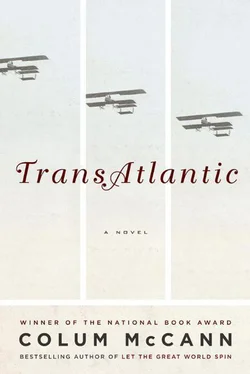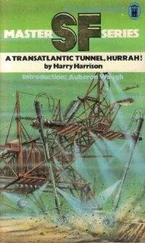They rebored the ice and it deepened, day after day, season after season. When it snowed the process was quicker, and there were nights when the ice could deepen by a full three inches.
The dark of their figures moved over the enormous white. When the lake was thick enough, they drew a heavy wooden frame behind them. The frame was shod with a sleeve of steel. The snow built up and collected in furrows. Row upon row of them appeared on the western edge of the lake. They looked to Lily like so many white eyebrows.
When the snow was cleared, Jon Ehrlich and his sons planed the ice down. They measured out large squares, each the size of a half door. They cut into the lake with an ice plow. The blades were set in grooves and the plow was drawn by the draft horse. Particles of ice shot up in the air. When the lake was deeply scored, they bent into the work of sawing along the plowed lines. The best ice was the color of crystal. Hard and pure.
THE FLOORS OF the storage sheds were covered with tanbark. No windows. Double-walled. The spaces between the inner and outer walls were filled with sawdust to insulate what lay inside. The ice cakes were packed high and so close together that they could hardly slide a blade between them.
It was to Lily one of the great mysteries: how the ice could hold out against the weather, even through the spring.
The cold fell. They farmed the lake. After a while even the youngest, Emily, went out to help them lift the cubes. They used longhandled hooks to slide the cakes across the lake towards the draft horse waiting, patient for its chores. One quick flick of the wrist could send the cake of ice spinning twenty yards across the lake. Lily liked to watch Emily guide the cakes across the surface, the elaborate motions the young girl made with the cubes.
WHEN THE TRIBUTARIES thawed, they floated the ice all the way to St. Louis on a barge that complained under the weight. The cakes were packed in crates and covered in straw to keep from melting. Elk bugled along the riverbanks. Peregrines soared in the blueness overhead.
Jon Ehrlich guided the barge past the sandbanks into port and packed the wares in an underground cellar along the riverfront. An ice dealer from Carondelet Avenue came and inspected the work. Crisp bills were counted out. It was good business. It was as if Reconstruction itself knew how to make things work. Hotels. Restaurants. Oyster shops. Rich men in fancy homes. Even sculptors who wanted to carve from giant ice blocks.
He bought a new lease on a small upstate lake. Experimented with new methods of insulation. Developed a toboggan system. Floated the cakes along a series of intricate canals. He drew up plans for a series of levers and pulleys for the storage sheds. There was a call to float ice down the Mississippi to cities as far away as New Orleans. They built a new house on the far side of their lake, open to morning sunlight. A smokehouse, too. Hanging from hooks were sides of bacon and cured ham. Medicinal plants: spikenard, snakeroot, senna, anise. Bins filled with sweet potatoes. Deep barrels of butter. Apple jelly. Peaches in preserve.
Lily had never seen such stores of food. She moved among the full shelves in a daze.
On Sundays they loaded their horse cart with spare provisions and drove them to church, early, so that they could be distributed quietly amongst others. Jon Ehrlich guided the reins down gently on the backs of the horses. His breathing was labored. Age was beginning to catch him. As if his body had taken on some aspect of the ice. Still, he unloaded the stores of food. Lily felt little call for the church, except as a moment away from her chores, but it gladdened her to give food away. She had seen worse hunger before, long ago. She did not care to see it again. Irish and German and Norwegian families lined up at the back door. An air of hammered pride about them, as if they would not need it long.
Jon Ehrlich came home one mild evening in the spring of 1876 and parked the horses down by the storage sheds. It had been a long journey. A week on the road. He came up through the newly cobbled yard, carrying a large canvas in an ornate frame. He called her name. She did not respond. He walked in the door and kicked off his boots, called her name again. She came from the kitchen at the back of the house. Shuffling her slippers on the floor.
— What in the name of God is the commotion?
He held the painting up for her to see. She thought at first it was a box of some sort. She stepped closer. She glanced at Jon Ehrlich, then at the box once more. A riverside in Ireland. An arched bridge. A row of overhanging trees. A distant cottage.
Lily did not know what to say. She reached out and touched the framed edge of the painting. Looking into it was like looking out another window. Clouds. Fast water. Geese gunneling through the sky.
— It’s for you.
— Why?
— I bought it in St. Louis.
— Why?
— It’s your country, he said.
He had bought it, he said, from an artist who was reputed to be famous. They had told him so at the marketplace.
— Your own people, he said.
Lily stood back from the painting. Her hands shook. She turned away.
— Lily.
He watched her walk out the door, towards the lake. The early insects of spring gathered around her. She sat down on the lakeside with her head in her hands. He could not understand it. He placed the painting against the table by the door. Said nothing more about it. He would, he thought, get rid of it tomorrow.
Later that night they lay in bed together, with their children, Emily and Tomas, asleep at their feet. She trembled and turned away from him, then swung quickly back towards him. She had been a child of deviants in Dublin, she said. Drunkards. She had never told a soul before. She had tried to forget it. She expected no judgment and wanted no pity. Her father drank. Her mother drank. Sometimes it seemed that the rats drank, the doors drank, the lintels drank, the roof drank, too. She was brought into bed between them, mother and father. A tenement house. The bedboard rattled. She lost a child. Fourteen years old. She had been sent to work as a maid. Hers had been a life of basements, of rat droppings, of inner staircases, of soup ladles. A half-day off a week. Sloshing through the wet dark streets. To buy tobacco. The only relief.
No part of Ireland had ever vaguely resembled the canvas Jon Ehrlich had brought home. The country he had brought her was unrecognizable except, perhaps, for one journey she had made from Dublin to Cork long ago. She had walked from a house on Great Brunswick Street. Walked and walked and walked. Fifteen, sixteen, seventeen days, south, through Wicklow, Waterford, over the mountains, across to Cork. She was a simple girl then. That was all. She followed a desire. She still recalled the canopies of trees, the shifting light on the fields, the valleys, the riverbanks, the wind whipping a hard low rain into her eyes, the hunger that grew up out of the land, its rotten odor settling over the men, women, children.
Now, a painting. Of all things. A painting. It seemed to say something to her that she had never understood before. A cathedral bell in Dublin sounded out. A horse screamed. Sackville Street. A gull moved over the Liffey. Still, she could not recall the exact sounds of her childhood: they shifted and unshaped in her mind. Why was it that certain moments returned to her? What called them forth? She pressed her face, now, into Jon Ehrlich’s chest. She was not sure what to do with such thoughts. She felt sliced open. The Duggan in her — the gone part of her — had never once thought that she could own anything at all, let alone such a painting. Forty-eight years old. She had been in the country now for more than thirty years. She had become American. At what whirling moment had she halted and turned, unbeknownst to herself, the other way? At what time had her life released its meaning? She couldn’t locate it. She had been, yes, a simple girl. A maid. In a house of unsimple things. Listening to strange talk. Ideas of democracy, faith, slavery, benevolence, empire. They were things she couldn’t quite understand, but they suggested an elsewhere. And so I walked. No idea where I was going. No plan, Jon Ehrlich. I just walked. Look at me now. A painting. You bring me a painting. You place a painting into my arms.
Читать дальше












